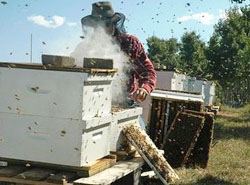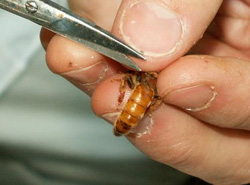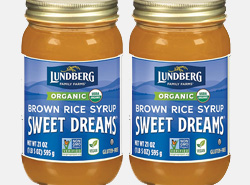- Animal Testing
- Beef
- Chicken
- Circuses
- Dairy
- Dissection
- Donkeys
- Down
- Eggs
- Foie Gras
- Fur
- Honey
- Hunting
- Lobster
- Pork
- Seal Hunt
- Turkey
- Wool
- Zoos
Honey

Honey is a product avoided by vegans, because it involves the exploitation of bees. Honeybees fly 55,000 miles and visit 2 million flowers to produce one pound of honey.
Even though pollen is the honeybee's primary source of nutrition, honey is their sole food source during cold weather and other times when alternatives are not available.

Bee Products
Products, besides honey, that come from the bee industry are:
- Bee pollen: pollen collected by bees; their primary source of nutrition.
- Royal jelly (bee milk): the pharyngeal gland secretions of the nurse bees. The queen larvae receives more of the royal jelly than the worker larvae, growing her into a queen bee.
- Beeswax: secreted by bees to help build their hives.
- Propolis: a brownish resinous material of waxy consistency collected by bees from the buds of trees and used as a cement and an antiseptic.
- Bee venom: obtained from a bee sting. Honeybees die after stinging someone.

Problems with the Honey Industry
- To prevent the queen bee from leaving the hive, honey producers sometimes cut off her wings.
- Often, queen bees are artificially inseminated.
- Large commercial operations sometimes take all the honey instead of leaving enough for the bees to get through the winter. The honey is then replaced with a cheap sugar substitute.
- Most beekeepers remove all the spring-season honey.
- In colder areas, some bee keepers will burn the beehives, killing all the bees inside, before the winter starts, to reduce cost.
- Bees are often killed or harmed by haphazard handling.

Honey Alternatives
Bees are hardworking animals who deserve to keep the labor of their work. Stealing products from them is a form of exploitation, which should and can be easily avoided. Honey can be replaced by rice syrup, agave nectar, barley malt, maple syrup, molasses, sorghum or fruit concentrates.

